Memorie.al publishes the official document of 1976 compiled by the Education-Culture section of the Central Committee of the APL, where a list of 51 names, all known characters such as: Prokop Mima, Robert Ndrenika, Bujar Lako, Roza Anagnosti, Ndrek Shkjezi, Adivije Alibali, Miltiadh Pope, Ilia Shyti, Naxhi Bakalli, Luigj Gurakuqi, Luiza Papa, would leave their jobs and leave Tirana “by transfer”.
Memorie.al publishes archival documents with the relevant facsimiles of the official correspondence of the ASP Central Committee of 1976, where some senior officials of the Central Committee apparatus covering the Art and Culture sector compiled a list which included a number of names. well-known cultural and artistic institutions of the city of Tirana, which included many of their most prominent personalities, such as; actors, directors, musicians, instrumentalists, singers, artistic leaders, etc., who would be removed from their workplaces and removed or “transferred” from the city of Tirana to other districts of the country. Their transfer was in fact an internment, as it was not for work purposes, but for the sole fact that all persons on that list had a biographical problem. So in a nutshell they were unwanted about Communist power. And this “black list” where most of its names consisted of the famous actors of the National Theater, Opera and Ballet Theater, the “New Albania” Kinostudio of Albanian Radio and Television, was sent for approval and the firm of the execution, Ramiz Alia himself, the secretary of the LCP covering the Arts and Culture. The list in question was marked “Very Secret” and it was compiled with the assistance of the State Security Directorate at the Ministry of Interior, as each of its names had special biographical data available only to that department. After the 4th Plenum of the APL and especially after the so-called Hostile Group on Art and Culture was struck in 1973, the period of cleansing in this sector would continue feverishly in the years ahead. And this is precisely what is in this original document of the Central Committee of the APL which specifically states, the whole repressive mechanism of the structures of the APL to strike to the end the so-called enemy element, in one of the most sensitive sectors of communist regime propaganda. This list includes the names of actors, composers, and directors who were included in these “Blacklists” in order to purge the entire arts and culture sector of the unwanted elements of the time regime. The late 60’s and early 70’s would set a record in terms of extreme communist ideology, not only of Albania’s Art and Culture sector, but of all the key aspects of daily life in the communist regime. Enver Hoxha. For the relevant instances of the ASP Arts and Culture instances, it didn’t matter whether Ilia Shyti, Roza Anagnosti, Sheri Mita, Robert Ndrenika, Prokop Mima, Ndrek Shkjesi, Bujar Lako, or director Luigj Gurakuqi had the skills and professionalism to do so. Soloist Luiza Papa(Çako), or painter Naxhi Bakalli. “Writers and artists are the aides of the party and as such, they should be political people in the first place.” This was the currency that prevailed everywhere in communist Albania of those years, sanctioned in all textbooks and those of communist propaganda, which found embodiment in every step and sector of life. The Communist regime, prior to the professionalism and high virtues of the people of art and culture, was interested in ideologizing with the “Revolutionary Spirit”, which in those years was imported in the most brutal way possible from distant China to the Cultural Revolution. Enver Hoxha’s famous statement about the so-called Coup d Etat Group in the army, “Wiping all the butts and debris of Puccini groups in every section of society with an iron broom once and for all,” was applied entirely to Albanian mid-century art and culture of the 1970s, which were wholly placed under the strict control of the organs of the “dictatorship of the proletariat.” This is evidenced by the teaching and this document that we are publishing in full in this writing.
LETTER SENT TO RAMIZ ALISE FOR ARTISTS WITH BAD BIOGRAPHIES
Information
ON THE POLITICAL COMPOSITION OF SOME FRAMES WORKING IN CENTRAL ARTISTIC INSTITUTIONS
Following the 4th plenum of the Central Committee of the Party, a number of measures have been taken to improve the political composition of the staff working in central artistic institutions such as the Kinostudio, the Opera and Ballet Theater, the National Theater, etc.
At the beginning of last year, during the debate on the fight against bureaucracy this problem was wider. The grassroots organizations raised some issues that had to be looked at.
During this period, the whole political system of bad composition was again identified.
The District Party Committee decided to follow the following criteria to improve the situation:
In the first place, those who have bad political make-up are removed, are more compromised and cannot get on stage.
Also, gradually remove those who do not have good composition and are not ideologically important.
For some artists who have political stains, they are soon to retire when they retire.
While some artists who saw problem in biography, retire on the basis of convincing work with them. Removing all of this will clear the artistic institutions and give way to the new and adaptable element in our central bodies.
In order to remove cadres of poor composition, it was taken into consideration not only the biographical aspect, but also their work and activity in that institution.
The criteria we set seem right to us. During this work some of these people left these institutions.
At the Opera and Ballet Theater, 6 people left: (Donika Miluka, Lazar Morcka, Lenka Sirija, Diana Keqja, Adivije Alibali and Jeta Nase)
Ferial Alibali, Lazër Vlashi was removed at the National Theater.
At Kinostudjo, 3 people were removed; Genc Rruzhdiu, Xhemal Broja and Zhak Vituli.
But it is clear that in these institutions we still have people of poor political composition. So as such in the list compiled last year, grassroots organizations have identified 14 people at the National Theater, at the Estrada Theater a year ago we had about 15 people, but now we have only 2, at the Opera and Ballet Theater 22. By Party committees are also taking steps to remove some others.
There are several ways to clean these institutions. There are those that are more compromised and talentless and should be removed quickly. Thus e.g. at the Opera House we have removed some who have a father or brother shot for hostility during the war or after liberation, such as Haki Bejleri, Thoma Nova. Although they have been in these institutions for 20 years, we think they should be removed from this central institution sometimes.
Some actors of the National Theater did not maintain a good political attitude during the war. So Prokop Mima during the war was with Balli’s youth. Ndrek Shkjezi had been with the Fascist Party during the war (but his wife is a party member, head of the region’s women’s organization). As they are on the verge of retirement, it will take one to two years for them to retire.
A wider group of cadres have members of their family collaborating with the enemy or with betraying organizations. For example, we can mention Ermelinda Pema, (her father during the war was a post-liberation prisoner, a brother convicted of attempted escape). Bujar Lako (his father during the war was a police deputy commissioner and commissar of the ballet gang of Safet Butka). Rosa Anagnosti, (an ex-liberator who was an officer and was convicted of hostile activity in 1950). With family members convicted of political misconduct are Vilhelm Konjari, Brixhida Xhepa, Jorgji Kareco and others.
This is meant to gradually remove them from the central artistic institutions and place them in district artistic bodies or in a club of Professional Unions, houses or cultural centers in Tirana.
Others have family members who have escaped, convicted of attempted escape, or fled overseas during the war. So does Robert Ndrenika (he has a fugitive brother in 1961 and an enemy uncle). Sheri Mita (her father fled overseas for studies and has not returned) Gezim Kaceli, (runaway brother, shot uncle). Whereas Manushaqe Cekani, Kristaq Rada, has brothers convicted of attempted escape. Zef Ndoci, Ilia Shyti, Miltiadh Papa also have such compositions.
This is also why they are thought to be removed from these central institutions and taken to other institutions, enterprises, agricultural cooperatives or districts.
A number of artists have their relatives convicted or implicated in hostile activity. Mention as an example: Luiza Papa, (is the wife of Gaqo Çako), who had political convicts of her uncle, Valter Bablusha, (uncle and uncle with Balli. There are others such as Sami Bakalli, Luigj Gurakuqi, uncle shot, etc. We only mention the negative aspects, but in the family composition they also have positive data.
The district and regional party committees are taking steps to remove these cadres gradually, but I think it needs to be done at a faster pace, especially with the Opera and Ballet Theater.
On the other hand, it is difficult to remove some of them because the family composition is complex, in addition to family members or relatives of poor political affiliation, they have a very good attitude. There are also cases of organizations that do not look at the problem as complex, including people who have a fugitive cousin or an enemy uncle when their parents are known to be party members.
In all cases it will be taken into account the work and behavior of everyone while working in these institutions. They are thought to be provided with a more profile-friendly job. Many of them will be located in the district’s artistic institutions.
3.4.1976 EDUCATION-CULTURE SECTOR
RUSMALI: COMRADE PIRRO, WE ARE AGREE, TO SHOW AND COMRADE RAMIZ
The secret document prepared by the Education-Culture section of the LLP Central Committee, with the names of artists and actors with biographical problems, was initially reviewed by Cajup Rusmal and then sent to the Tirana Party Committee for approval. This is clearly seen in the letter from Caiup Rusmal, which reads:
Comrade Pirro
We also discussed these issues with the members of the Tirana Party Committee, who agree. We think that it can also be passed on to Comrade Ramiz.
8.4.1976 Çajup Rusmajli (firm)
RAMIZ ALIA: WHAT HAPPENS TO YOU, WHEN AND HOW TO REMOVE?
At the same time with the Committee of the Party of Tirana, the secret document prepared by the Education-Culture Sector in the Central Committee of the LLP, with the names of artists and actors with biographical problems, was sent to Ramiz Alia for approval, who with his writing noted: “
This information is very eclectic and will go away, and should be seen in the complexity of the problem. Everyone’s behavior will also be taken into account. What can be done specifically? Who escapes and why? And who wouldn’t go? Who now and who later? Ramiz (firm)
RAMIZ ALIA: I AM CORRECT, MAKE A PROGRAM OF HOW TO ACT
As can be seen from the note that Ramiz Alia made on the document in question with the names of artists and actors with biographical problems who had to be removed from their jobs, transferred, or retired, there was initially some hesitation from For his part, how was everyone dealing with these people and how would they be treated? But his reluctance did not seem to last long, as he was forced to accept the document and fully agree with it. This is also evidenced by the letter signed by the official Jakup Mato, an officer of the Education and Culture sector in the Central Committee. His note reads: “
A.A This information was seen by Comrade Ramiz. It was said again to make a program of action to improve the situation: who is removed, where they are removed, who are removed immediately, who gradually. These messages were told to Comrade Sotir Kamberi on 14. 4. 1976
20.4.1976
Jakup Mato






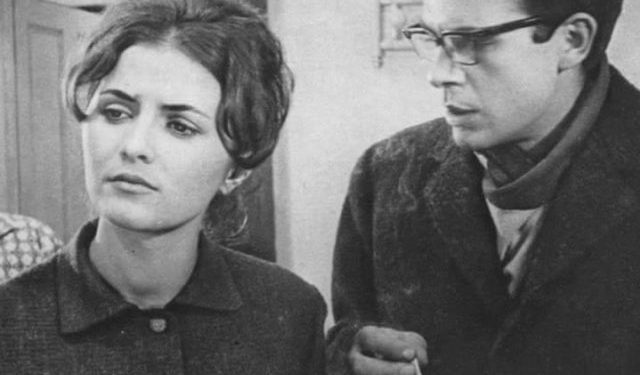

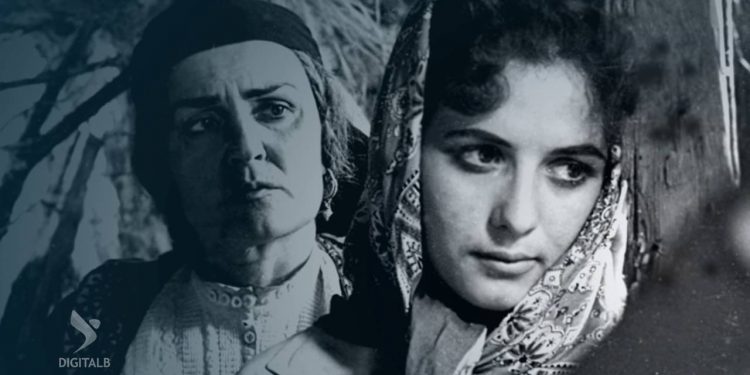

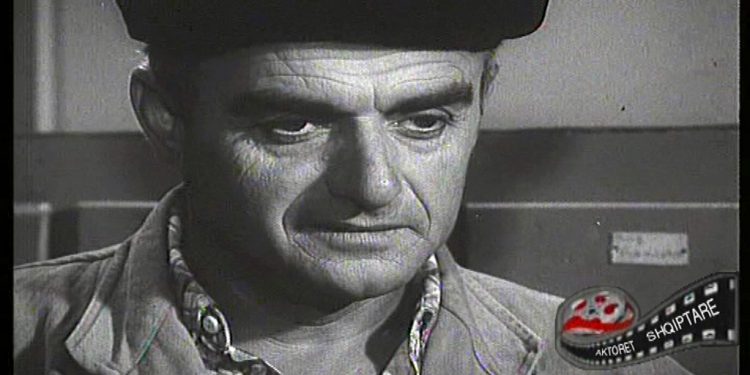
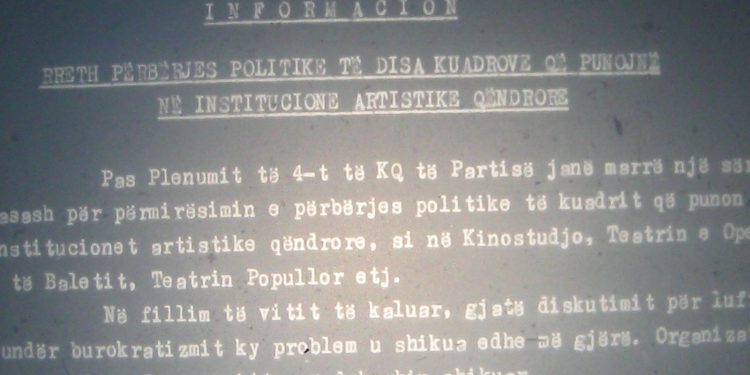
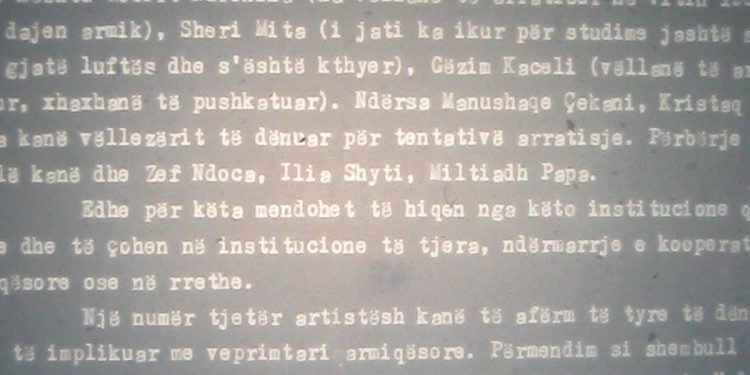
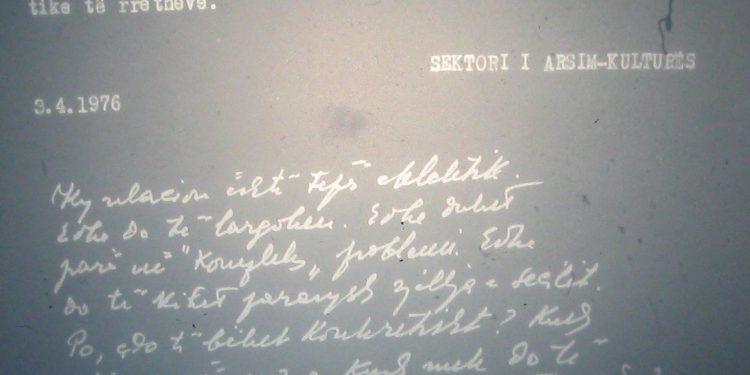

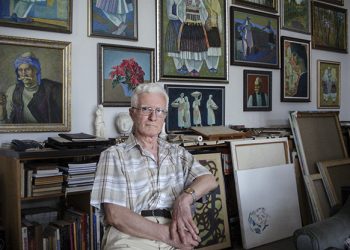
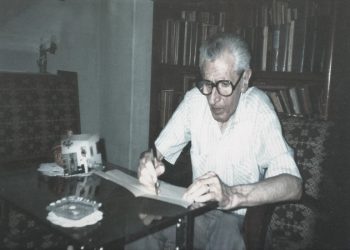
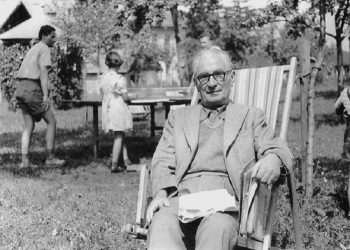

![“Count Durazzo and Mozart discussed this piece, as a few years prior he had attempted to stage it in the Theaters of Vienna; he even [discussed it] with Rousseau…” / The unknown history of the famous Durazzo family.](https://memorie.al/wp-content/uploads/2026/02/collagemozart_Durazzo-2-350x250.jpg)
